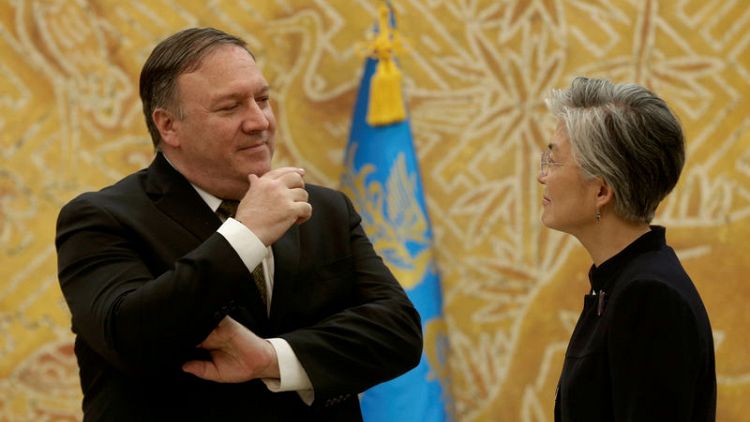By Hyonhee Shin
SEOUL (Reuters) - U.S. Secretary of State Pompeo has expressed "discontent" with an inter-Korean military pact reached during last month's summit, South Korea's foreign minister said on Wednesday, in a rare disclosure of signs of disagreement with its U.S. ally.
The two Koreas agreed to halt military drills, set up a no-fly zone near the border and gradually remove landmines and guard posts within the Demilitarised Zone, among other steps.
The deal was sealed by South Korean President Moon Jae-in and North Korean leader Kim Jong Un during their third summit in Pyongyang on Sept. 18-20.
During an annual parliamentary audit on Wednesday, an opposition party lawmaker asked Foreign Minister Kang Kyung-wha if Pompeo had complained about the agreement during a phone call reported earlier by Japan's Nikkei newspaper.
"Yes, that's correct," Kang said in response. "I wouldn't say he made strong expressions. (It was) discontent, about how he was not briefed sufficiently, and he had a lot of questions within my knowledge."
Her remarks amounted to a rare confirmation of discord between Seoul and Washington, amid U.S. concerns that inter-Korean relations may be warming too fast relative to negotiations to dismantle North Korea's nuclear arms programme.
While maintaining that it remains in lockstep with the United States, South Korea has forged ahead with efforts to engage with North Korea, even as critics accused Moon of naively focusing on feel-good theatrics at the expense of real progress in persuading North Korea to give up its nuclear weapons.
Kim vowed to work toward denuclearisation during his unprecedented June summit with U.S. President Donald Trump. But Pyongyang's actions have since fallen short of U.S. demands for irreversible steps to scrap its arsenal, including a full disclosure of nuclear facilities and materials.
When asked by a South Korean ruling party lawmaker whether Washington felt the South was pushing ahead too rapidly with its reconciliation policy toward the North, Kang cited views regarding "adjusting the pace" of inter-Korean moves.
"I don't think the military agreement would bring significant changes in terms of readiness or operations, but they (U.S.) could complain we made far more concessions than the North did, especially ahead of the second North Korea-U.S. summit," a South Korean military source told Reuters, asking for anonymity due to the sensitivity of the matter.
"The U.S. could prefer a reciprocal approach where each side makes a concession step by step, rather than a comprehensive bargain as we did."
Kang and Pompeo spoke by phone on Sept. 17, a day before the three-day inter-Korean summit kicked off and shortly after Seoul informed Washington of the military accord, a diplomatic source told Reuters.
The Pyongyang summit was in part designed to help revive nuclear talks between the North and the United States, which were on shaky ground after Trump cancelled Pompeo's visit to the North in late August, citing a lack of progress.
(Reporting by Hyonhee Shin; Editing by Mark Heinrich)
